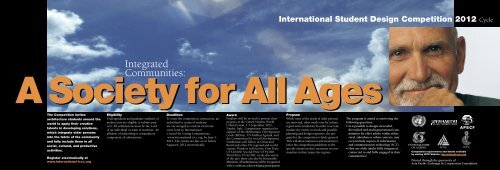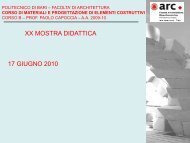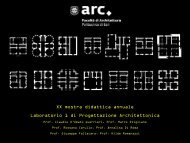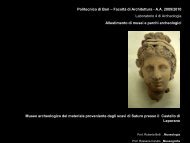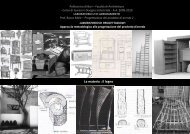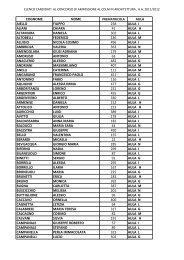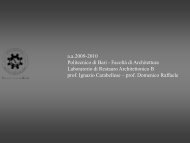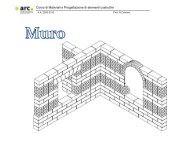2012, Student Design Competition Brochure - International Council ...
2012, Student Design Competition Brochure - International Council ...
2012, Student Design Competition Brochure - International Council ...
Create successful ePaper yourself
Turn your PDF publications into a flip-book with our unique Google optimized e-Paper software.
<strong>International</strong> <strong>Student</strong> <strong>Design</strong> <strong>Competition</strong> <strong>2012</strong>CycleIntegratedCommunities:A Society for All AgesThe <strong>Competition</strong> invitesarchitecture students around theworld to apply their creativetalents in developing solutions,which integrate older personsinto the fabric of the communityand fully include them in allsocial, cultural, and productiveactivities.Register electronically atwww.international-iccc.orgEligibilityUndergraduate and graduate students ofarchitecture are eligible to submit projects.All submissions must be the workof an individual or team of students. Anaffidavit of authorship is a mandatorycomponent of submissions.DeadlinesTo enter the competition, instructors, anindividual or teams of studentsare encouraged to send an electronicentry form to <strong>International</strong><strong>Council</strong> for Caring Communities,www.international-iccc.org, by June 1,<strong>2012</strong>. The entries are due on or beforeAugust 8, <strong>2012</strong> electronically.AwardFinalists will be invited to present theirprojects at the United Nations WorldUrban Forum, 1-7 September <strong>2012</strong>,Naples, Italy. <strong>Competition</strong> organized insupport of the Millennium DevelopmentGoals (MDGs), UN Habitat Agenda, andthe Commission for Social Development.Exhibitions will follow in China andBrazil and other UN regional and worldvenues. Winners will receive: First PrizeUS $10,000; Second Prize US $5,000,Third Prize US $2,500. At the discretionof the jury there can also be HonorableMentions. All submissions will be recognizedwith a certificate acknowledging participation.ProgramWhile some of the needs of older personsare universal, other needs vary by culture,region and community. In order to accommodatethe variety in needs and possibleplanning and design responses, the programfor the competition is fairly general.This will allow instructor and students totailor the competition guidelines to thespecific situations they encounter in communitiesin their respective regions.The program is aimed at answering thefollowing questions:• Is it possible to design successful,diversified and multi-generational communitiesfor older adults within eitherrural, suburban or urban contexts, mayeven include aspects of informationand communication technology (ICT).• How are older adults fully integrated,connected to and fully engaged in theircommunities?UN PROGRAMMEON AGEINGACSAICCC<strong>Competition</strong> requirements and details availableby visiting ICCC Website: international-iccc.orgPrinted through the generosity ofAsia Pacific Exchange & Cooperation Foundation
“We are proud to continue thefostering of practical research withthe next generation of designers.The <strong>Design</strong> <strong>Competition</strong> providesa unique opportunity to stimulatenew thinking and globally showcasemeaningful solutions that enhanceliving environments for all ages.It takes a quantum leap forward inthinking “out-of-the-box”.The competition provides creative‘universal design’ solutions thatcould benefit all members of oursociety, provides an opportunity forpresent and future.”Mr. Xiao Wunan, Executive Vice ChairmanAsia Pacific Exchange & CooperationFoundation (APECF)Beijing, ChinaChair:Mr. Xiao WunanExecutive Vice ChairmanAsia Pacific Exchange &Cooperation FoundationBeijing, ChinaVice Chairs:Dr. Linamara Rizzo BattistellaMinister of the State of SaoPaulo for Rights of PersonsWith Disability, BrazilArq. Emiliano CiarlettiPrincipal, Ascanio& Emiliano CiarlettiArchitecture, ItalyDean Urs Peter GauchatCollege of Architectureand <strong>Design</strong>,New Jersey Institute ofTechnology, USA“This is the age of aging. But it’s onlythe dawn of that age.”H.E. Julia AlvarezFormer Ambassador for theDominican Republic tothe United Nations“Pitting the interests of the old against the young makesus all poorer. Whereas harnessing the enthusiasm of theyoung with the experience of the old makes us all richer.”Dean Urs Peter Gauchat, College of Architecture and <strong>Design</strong>,New Jersey Institute of Technology, USA<strong>Competition</strong> Background:Through its efforts, this student competition seeks to encourageThe Integrated Communities: A Society for all Ages student design concepts and projects, which can address the needs and aspirationscompetition was established in 1994 to enhance understanding of of multi-generational communities.the Age of Longevity and showcase innovative design solutions. Thisprogram is the centerpiece of the <strong>International</strong> <strong>Council</strong> for CaringEligibility:Communities’ (ICCC) global dialogues; it endeavors to prepare theAny current architectural student or team of students in goodnext generation of designers to enhance the quality of life for thestanding in either a graduate or undergraduate program worldwide.growing graying society. The competition is organized in conjunction Deadlines:with the United Nations Programme for Human Settlements (UN- To enter the competition, students are encouraged to send an entryHABITAT) and the United Nations Programme on Ageing, Departmentof Economic and Social Affairs (DESA) and the private sector. due electronically on or before August 8th, <strong>2012</strong>. Electronically sentform electronically on or before June 1, <strong>2012</strong>. All entry projects areFurthermore, it is endorsed around the world by the Association of to website: www.international-iccc.org No entries will be receivedCollegiate Schools of Architecture.after August 8th.A Sleeping Giant is being awaken, “The Agequake” is here! Every Awards:month around the world over 1 million people turn 60 years old, with Awards include: First Prize: US $10,000; Second Prize: US $5,000;the fastest growth in developing countries.Third Prize: US $2,500.Jury:ICCC’s mission is to help communities worldwide address the social,An international jury of renowned architects, gerontologists, andeconomic and cultural impact of aging populations in the design andUnited Nations officials will judge the entries in August.planning for a better quality of life for all ages.Exhibitions:To address this issue, the ICCC has organized since 1995 a series of The <strong>2012</strong> Cycle has special significance for it will offer winnerscompetitions, with exhibitions in Chile for the Americas; Hungary for worldwide exposure at two important international venues: TheCentral and Eastern Europe; Spain for the 2nd World Assembly on United Nations World Urban Forum, Naples, Italy, September 1-7,Ageing; China and Thailand for the Economic and Social Commission <strong>2012</strong> and the “Caring Communities for the 21st Century: Imaginingthe Possible” <strong>International</strong> High-Level Session, February 2013,for Asia and the Pacific (ESCAP); Ireland and Japan, and at UnitedNations Headquarters in New York in conjunction with the United at United Nations Headquarters. Other exhibitions will be held inNations Commission for Social Development.conjunction with international events in China and Brazil, UnitedNations Regional Commissions and other world venues.Overall Purpose:<strong>Competition</strong>’s interrelated long-term goals are:Why a <strong>Competition</strong>?1. To raise the awareness of architectural and design students to the The <strong>Competition</strong> reinforces the notion that the next generation must,needs of older persons;and can, proactively plan for a society of diverse ages, and for one2. To increase cross-cultural understanding;with increasing proportions of older persons. It is, after all, going to3. To incorporate the growing role of ICT in communities;fall on their shoulders to find solutions and support for an everincreasingpopulation of elderly people. The <strong>Competition</strong> is aimed at4. To encourage a close connection between proposed solutions andthe real world. Past competitions have influenced local planning, answering the following questions:educational curricula, encouraged dialogue and establishednew mindsets; they all deal with inclusive communities, createdthrough a combination of new construction, renovation, reuse andenvironmental intervention.<strong>International</strong> <strong>Council</strong> for Caring Communities (ICCC) is a not-for-profit organization that has Special Consultative Status with theEconomic and Social <strong>Council</strong> of the United Nations (ECOSOC). Established in 1994, ICCC responds to the challenges and opportunitiesof a rapidly aging global population by stimulating and identifying successful strategies and solutions. ICCC encourages their adaptationand/or replication throughout developing and developed countries. ICCC serves not only as an instigator but also as a bridge joininguniversities, government agencies, the private sector, NGOs, as well as United Nations agencies to promote a Society for All Generations.<strong>Competition</strong> Advisory Board as of February <strong>2012</strong>Co-Chair: Dr. Rod Hackney, Rod Hackney and Associates LtdCo-Chair: Dr. Gisela Loehlein, Ajman University UAEMs. Cecilia Martinez, United Nations Programme for Human Settlements (UN-HABITAT)/NY)Ms. Rosemary Lane, United Nations Programme on Ageing, Department of Economic and Social AffairsH.E. Ms. Josephine Ojiambo, Permanent Mission of Kenya to the United NationsMs. Marilyn Amponsah Annan, New Generation Africa Foundation, GhanaDra. Arq. Maria de los Ang. Barahona I., University of Costa Rica, Costa RicaArq. Marc Clemenceau Bailly, Gage/ Clemenceau Architects, USAArq. Noel J. Brady, NJBA A+U, IrelandDr. Aliye Pekin Celik, Consortium for Sustainable Urbanization, USAMs. Karin Delgadillo, Fundacion ChasquiNet, EcuadorMs. Christine Gong, Chinachain Investment Holdings, Limited, ChinaMr. Eduardo Guimaraes, <strong>International</strong> Relations Consultant, Former Secretary of Paraná and Curitiba, BrazilMs. Tia Kansara, Kansara Hackney Ltd. UKArq. Joseph Katanik, Hudson River Architects, USADr. Motoo Kusakabe, Open City Foundation, UKDr. Peter Mathias, Bridge Research and Development, UKProfessor Suha Ozkan, Middle East Technical University, TurkeyDr. Danilo Piaggesi, Fondazione Rosselli Americas, USADr. Alexandre Sidorenko, Senior Advisor, European Centre for Social Welfare Policy and Research, AustriaMr. Klaus Stoll, Global Knowledge Partnership Foundation, SpainArq. Aleksandar - Sasha Zeljic, Gensler, USAProfessor Jan Wampler, Massachusetts Institute of Technology, MIT, USAMr. Xiao Caiwei, China National Committee on Ageing, ChinaGuideline Abstract:• Is it possible to design diversified and multi-generationalcommunities for older adults within either rural, suburban orurban contexts and may even include aspects of information andcommunication technology (ICT).• How are older adults fully integrated, connected to and fullyengaged in their communities?• How to encourage sustainable design=sustainable life?Key issues include:• Location: within walking distance of facilities where older personscan contribute.• Connectivity: physical and possibly electronic connectivity to amenitiesand services.• Symbiosis: between talents and interests of older people and needsof society.• Dignity: preserve the integrity and personal domain despite somereduction in faculties.• Access: to healthcare, food, educational facilities and neighborhoodsfrom which they came.• Security: and safety in physical and psychological terms.Project Scope and Guidelines:1. Identify and analyze an existing neighborhood or district. Thecontext may be urban, suburban or rural, which containsolder adults.2. Building or intervention, which acts as a catalyst to addressthe key issues.3. Illustration of how the proposed intervention becomes an integralcomponent of the existing social fabric.<strong>Competition</strong> requirements and details available byvisiting ICCC Website: international-iccc.orgIntegrated Communities: A Society For All Ages<strong>International</strong> <strong>Student</strong> <strong>Design</strong> <strong>Competition</strong> <strong>2012</strong> CycleEntry FormName of <strong>Student</strong>:____________________________________________________________________________________________________Home Address: ______________________________________________________________________________________________________________________________________________________________Telephone No.:__________________ Fax No.: ___________________E-Mail Address:_____________________________________________________________________________________________________Enrolled in what Degree Program: Graduate UndergraduateName of Institution: _________________________________________________________________________________________________Faculty Advisor: ___________________________________________Telephone No.:__________________ Fax No.: ___________________E-Mail Address:_____________________________________________________________________________________________________Please register electronically by June 1, <strong>2012</strong>www.international-iccc.org.“The student designs succeed on several levels: theirthoughtful research and responsiveness to the needs ofolder persons; the balance of creativity and practicalityand ultimately, their youthful optimism which will benefitus all. The fast approaching ‘Agequake’ makes it vitalthat this phenomenon of aging be studied and approachedby students in a pro-active manner.”Professor Dianne DavisFounding President, ICCC<strong>International</strong> <strong>Student</strong><strong>Design</strong> <strong>Competition</strong><strong>2012</strong> CycleIntegrated Communities:A Society forAll Ages


